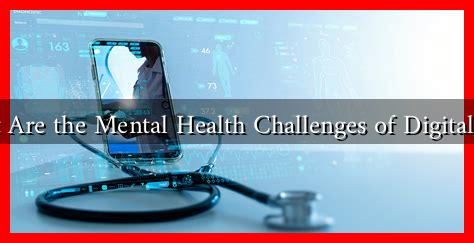-
Table of Contents
Mental Health Challenges of Digital Use
In an increasingly digital world, the impact of technology on mental health has become a pressing concern. While digital devices and platforms offer numerous benefits, they also present significant mental health challenges. This article explores the various ways in which digital use can affect mental well-being, supported by research, statistics, and real-world examples.
The Rise of Digital Dependency
As technology becomes more integrated into our daily lives, the phenomenon of digital dependency has emerged. Many individuals find themselves unable to disconnect from their devices, leading to a range of mental health issues. According to a study by the Pew Research Center, 46% of teens report feeling overwhelmed by the pressure to be constantly connected.
Common Mental Health Challenges
Digital use can lead to several mental health challenges, including:
- Anxiety: Constant notifications and the fear of missing out (FOMO) can create heightened anxiety levels. A study published in the journal Computers in Human Behavior found that individuals who frequently check their social media accounts report higher levels of anxiety.
- Depression: Excessive use of social media has been linked to feelings of inadequacy and low self-esteem. A 2019 study in the American Journal of Preventive Medicine found that individuals who spend more than three hours a day on social media are at a higher risk of depression.
- Sleep Disorders: The blue light emitted by screens can disrupt sleep patterns, leading to insomnia and other sleep-related issues. The National Sleep Foundation reports that 90% of Americans use electronic devices in the hour before bed, which can negatively impact sleep quality.
- Social Isolation: Paradoxically, while digital platforms are designed to connect people, they can also lead to feelings of loneliness. A study by the University of Pennsylvania found that limiting social media use to 30 minutes a day significantly reduced feelings of loneliness and depression.
Case Studies and Statistics
Several case studies highlight the mental health challenges associated with digital use:
- Teenagers and Social Media: A 2020 study by the Royal Society for Public Health in the UK found that Instagram, Snapchat, and Facebook were linked to increased feelings of anxiety, depression, and body image issues among young users.
- Workplace Burnout: The rise of remote work has blurred the lines between personal and professional life. A survey by FlexJobs revealed that 75% of remote workers experience burnout, often due to the inability to disconnect from work-related digital communications.
- Gaming Addiction: The World Health Organization has recognized gaming disorder as a mental health condition. Research indicates that excessive gaming can lead to social withdrawal, anxiety, and depression.
Strategies for Healthy Digital Use
To mitigate the mental health challenges associated with digital use, individuals can adopt several strategies:
- Set Boundaries: Establish specific times for digital use and stick to them. This can help create a healthier balance between online and offline activities.
- Practice Mindfulness: Engage in mindfulness practices to reduce anxiety and improve focus. Techniques such as meditation and deep breathing can be beneficial.
- Limit Social Media Exposure: Consider reducing the time spent on social media platforms. Tools like screen time trackers can help monitor usage.
- Engage in Offline Activities: Pursue hobbies and activities that do not involve screens, such as reading, exercising, or spending time with friends and family.
Conclusion
The mental health challenges associated with digital use are significant and multifaceted. As technology continues to evolve, it is crucial for individuals to be aware of the potential risks and take proactive steps to protect their mental well-being. By setting boundaries, practicing mindfulness, and engaging in offline activities, individuals can foster a healthier relationship with technology. Ultimately, understanding the impact of digital use on mental health is essential for navigating the complexities of our modern world.
For more information on mental health and digital use, consider visiting resources like the National Alliance on Mental Illness (NAMI).

